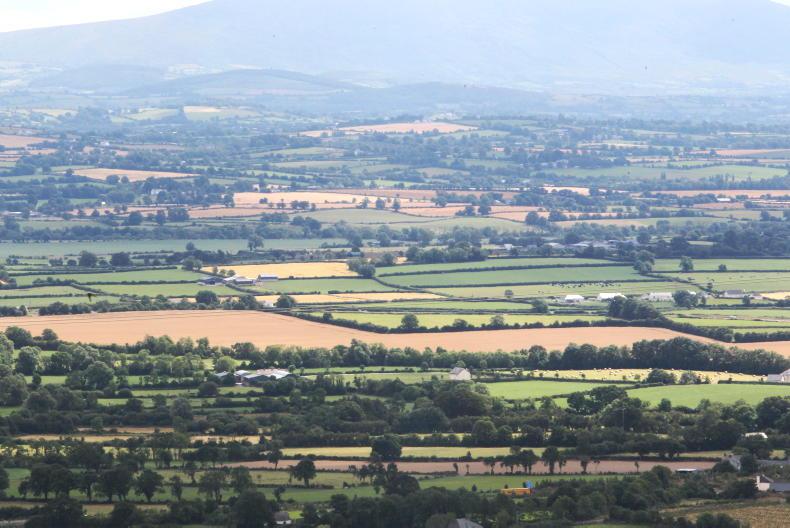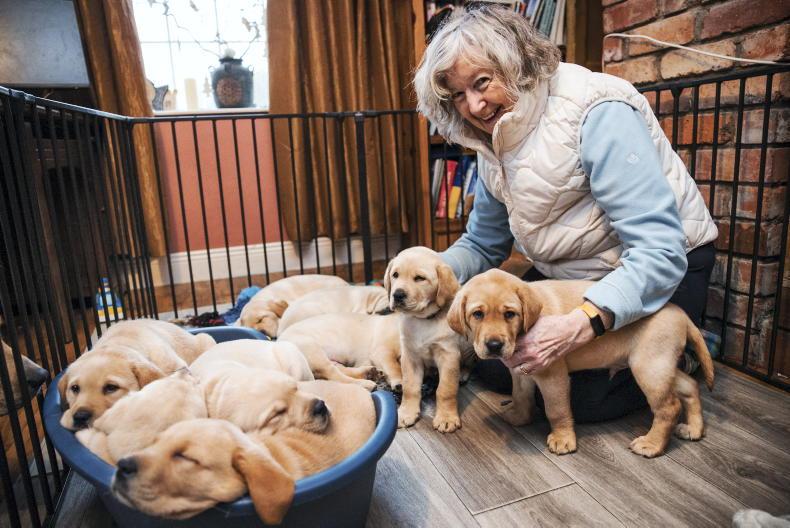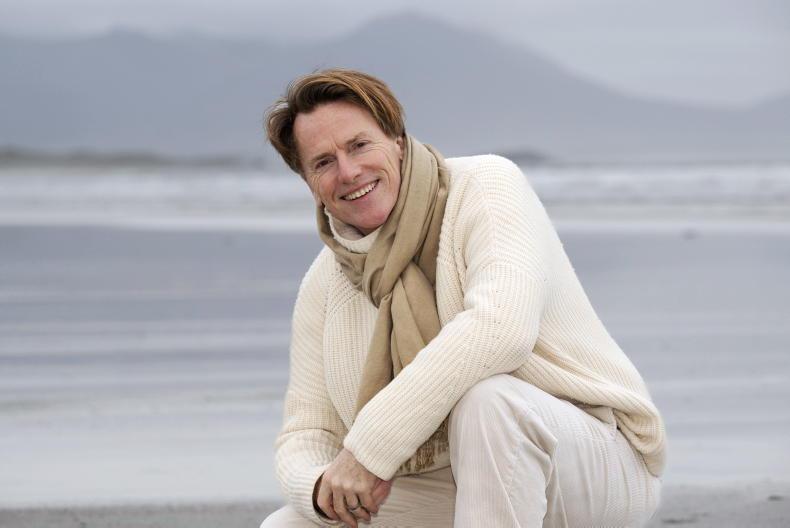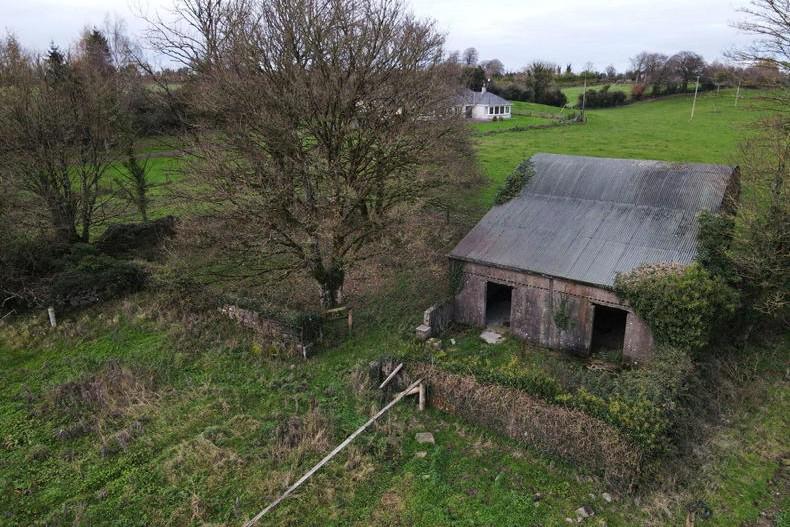Although she grew up in Newbridge, Co Kildare, trips to the countryside were a fundamental part of Brenda Donohue’s upbringing, and something she says, looking back now, formed her.
She regularly cycled from Newbridge to Allenwood, where her father grew up, to visit her granny, who had a little cottage along the canal, spending many holidays there.
“She had chickens, a donkey; she had the big gate and the apple trees. She was a real country woman. Right beside her house was the canal with the old milestone, so I would go out to her for a lot of the summer. I enjoyed it.
“She had very old-fashioned values – you wouldn’t go up to the shops without your shoes polished and speak only if you were spoken to – because we were real yappers,” she says, smiling.
“I remember going for beautiful walks along the canal with her, and there was a kind of secret passage to go under the bridge, to bring you under the canal and up the other side of the swing bridge near Robertstown.”
Then there were days on the bog with her granny and cousins. This was juxtaposed with life as an urban Billie Barry kid, so it was an interesting mix.
“Now having kids myself and the money you spend sending them to the Gaeltacht, this camp or adventure centre. I was out in granny’s, cutting turf in the bog,” jokes Brenda.

RTE's Brenda Donohue has fond memories of the countryside from her youth. \ Claire Nash
All those rural memories have come flooding back since the Kildare native returned to work on RTÉ Radio 1’s CountryWide show over the last year. She’s just back from Leitrim, where she did an outside broadcast with Edwina Guckian, who has launched a rambling house initiative to gently combat social isolation post-pandemic.
“I remember being in my granny’s house and it was all about mitching. That’s what we used to call, so and so was up last night mitching. Calling or rambling, but in Kildare it was mitching. It means something else now, and I did that as well,” she laughs.
Brenda says she constantly “falls back on that time” and says it has made her the person she is.
“I think it gives me an understanding, particularly, of the challenges people have in rural Ireland, the gentleness of rural Ireland. I think I fall back on it and it helps me do what I do, because I appreciate it all.”
The Gerry Ryan Show
Her break into radio came about not exactly by design, while she was studying in UCD. Involved in the drama society, she helped to line up guests when the 2FM Roadcaster came to the campus.
The producer asked her if she had any ideas for the fledgling Gerry Ryan Show, which led to her becoming a roving reporter on the morning show shortly after its launch, where she stayed for 18 years.
“He (Gerry) turned out to be this incredible underdog and broadcaster. I was lucky enough to be there as the programme evolved and it became, I think, the last of the type of programme, one that had a real destination feel about it. ‘You must listen’, or ‘did you hear (what was on the Gerry Ryan show)’ or ‘what will he say about that’?”
With radio interviews, you can explore the how, where, when, why – how are you? You can go on a much deeper level. You can have nuances, you can have pauses
“I mean, you wouldn’t get away with an inch of it now, but we did and we had a great time,” recalls Brenda fondly. “Gerry, very interestingly, had a real connection with farmers.
“I think that’s one of the reasons we got on so well. I brought a bit of country (bogness) to the show that he really liked,” and she was one of the few people who could make him laugh, and vice versa.
Having just finished college, it was an “amazing” thing to be part of, and she [Brenda Donohue] recalls some “mad travel trips” on the show
“To this day, particularly when I go down the country, the amount of people of a certain era, not young ones, people in their 40s, 50s, and 60s, will say ‘I loved that programme’ ‘I remember that programme because….’
“I find that amazing because who has that impact now? – because it’s a very fickle business.”
Despite plenty of TV credits, including Secrets, The Afternoon Show, Celebrity Bainisteoir and more recently The Today Show, radio remains her first love.
“With radio interviews, you can explore the how, where, when, why – how are you? You can go on a much deeper level. You can have nuances, you can have pauses,” she says with clear affection for the medium.
“I still think radio matters hugely in this country. It will change and it is shifting, but it still really matters.”
“I’ve worked across a breadth of different programmes in many areas, and whether you’re producing Liveline, whether you’re on Oliver (Callan), or doing your own programmes, it’s a medium where you can really connect with the listener, when you can feel them, hear them or talk to them. That’s what really drives the programme,” she says.
Variety is the spice of life
Unlike some, Brenda loves the challenge of having to adapt to many different roles within the organisation and feels she would get bored doing the same thing for a long time.
Speaking about the summer period, where she was producing Liveline, The Oliver Callan Show, working on CountryWide and others, Brenda says, “You have to evolve, you have to change, develop and challenge yourself, so each programme, each presenter, every set of listeners bring their own kind of challenges.”
She also presents and produces Like Family, a human interest series charting social change and another called Services Ahead, following 24-hours in a service station with stories from staff and customers. Brenda jokes that the idea for the programme came from spending so much time on the road. The next edition airs on Christmas Eve on RTÉ Radio 1.
Married to Denis Cousins, the couple have three children. Ali (23), who initially studied financial maths before moving into medicine is now in her third year. Brenda says whatever area Ali eventually specialises in, she will be very compassionate.
Her second child, Robyn (22), is in Boston, in her final year of college studying global business. That was a “big wrench” for her, as they are very similar in ways and she misses her rushing around the house.
She says the baby of the family, Harvey (15), is very relaxed and is more interested in soccer than the Junior Cert.
With her family growing up and less reliant on her, Brenda says she can feel a shift and a change, and she is looking forward to speaking about this at the Women & Agriculture conference – and hopefully, getting a bit of advice from the other attendees on how best she can navigate that.

With her family growing up and less reliant on her, Brenda says she can feel a shift and a change. \ Claire Nash
“For more than 20 years, my life has been work, getting home, dropping, collecting, homework, after-school study, exams, cleaning or asking is there lunches in, washing – and trying to keep my hair straight.”
Now she has to figure out how to embrace her extra time, and possibly to do something in the community.
Very much a person who lives in the moment, Brenda feels lucky to have her parents Mary and Michael, both 85, well after a tough year “healthwise” for them.
“Very much embraced” by their community in Newbridge, where they still live, she simply wants to enjoy the good days with them and help out as much as possible with the practicalities of life.
At the same time, Brenda hopes to continue to tell the stories of a changing rural Ireland on CountryWide, something she is really enjoying, and perhaps develop a programme aimed at her own age group.
Women in broadcasting
“I think things have improved slightly. The perception has changed to a certain extent. Women in news and current affairs are beyond well represented, respected and encouraged. But there is a thing still I think that women in entertainment/human interest are overlooked, or not seen as important.”
What she
does to relax
“I’ve got myself an electric bike and I keep saying I’m going ar nós na gaoithe (like the wind) on the back roads of Kildare. I love it, it’s given me great joy, actually.”
Being a sidekick
“I remember one particular manager saying ‘you’re a fantastic sidekick’. That was meant to be a compliment. Whereas I know if I was a man as a sidekick, they would automatically be saying that person can present the programme. Now, it has changed and is changing.”
Although she grew up in Newbridge, Co Kildare, trips to the countryside were a fundamental part of Brenda Donohue’s upbringing, and something she says, looking back now, formed her.
She regularly cycled from Newbridge to Allenwood, where her father grew up, to visit her granny, who had a little cottage along the canal, spending many holidays there.
“She had chickens, a donkey; she had the big gate and the apple trees. She was a real country woman. Right beside her house was the canal with the old milestone, so I would go out to her for a lot of the summer. I enjoyed it.
“She had very old-fashioned values – you wouldn’t go up to the shops without your shoes polished and speak only if you were spoken to – because we were real yappers,” she says, smiling.
“I remember going for beautiful walks along the canal with her, and there was a kind of secret passage to go under the bridge, to bring you under the canal and up the other side of the swing bridge near Robertstown.”
Then there were days on the bog with her granny and cousins. This was juxtaposed with life as an urban Billie Barry kid, so it was an interesting mix.
“Now having kids myself and the money you spend sending them to the Gaeltacht, this camp or adventure centre. I was out in granny’s, cutting turf in the bog,” jokes Brenda.

RTE's Brenda Donohue has fond memories of the countryside from her youth. \ Claire Nash
All those rural memories have come flooding back since the Kildare native returned to work on RTÉ Radio 1’s CountryWide show over the last year. She’s just back from Leitrim, where she did an outside broadcast with Edwina Guckian, who has launched a rambling house initiative to gently combat social isolation post-pandemic.
“I remember being in my granny’s house and it was all about mitching. That’s what we used to call, so and so was up last night mitching. Calling or rambling, but in Kildare it was mitching. It means something else now, and I did that as well,” she laughs.
Brenda says she constantly “falls back on that time” and says it has made her the person she is.
“I think it gives me an understanding, particularly, of the challenges people have in rural Ireland, the gentleness of rural Ireland. I think I fall back on it and it helps me do what I do, because I appreciate it all.”
The Gerry Ryan Show
Her break into radio came about not exactly by design, while she was studying in UCD. Involved in the drama society, she helped to line up guests when the 2FM Roadcaster came to the campus.
The producer asked her if she had any ideas for the fledgling Gerry Ryan Show, which led to her becoming a roving reporter on the morning show shortly after its launch, where she stayed for 18 years.
“He (Gerry) turned out to be this incredible underdog and broadcaster. I was lucky enough to be there as the programme evolved and it became, I think, the last of the type of programme, one that had a real destination feel about it. ‘You must listen’, or ‘did you hear (what was on the Gerry Ryan show)’ or ‘what will he say about that’?”
With radio interviews, you can explore the how, where, when, why – how are you? You can go on a much deeper level. You can have nuances, you can have pauses
“I mean, you wouldn’t get away with an inch of it now, but we did and we had a great time,” recalls Brenda fondly. “Gerry, very interestingly, had a real connection with farmers.
“I think that’s one of the reasons we got on so well. I brought a bit of country (bogness) to the show that he really liked,” and she was one of the few people who could make him laugh, and vice versa.
Having just finished college, it was an “amazing” thing to be part of, and she [Brenda Donohue] recalls some “mad travel trips” on the show
“To this day, particularly when I go down the country, the amount of people of a certain era, not young ones, people in their 40s, 50s, and 60s, will say ‘I loved that programme’ ‘I remember that programme because….’
“I find that amazing because who has that impact now? – because it’s a very fickle business.”
Despite plenty of TV credits, including Secrets, The Afternoon Show, Celebrity Bainisteoir and more recently The Today Show, radio remains her first love.
“With radio interviews, you can explore the how, where, when, why – how are you? You can go on a much deeper level. You can have nuances, you can have pauses,” she says with clear affection for the medium.
“I still think radio matters hugely in this country. It will change and it is shifting, but it still really matters.”
“I’ve worked across a breadth of different programmes in many areas, and whether you’re producing Liveline, whether you’re on Oliver (Callan), or doing your own programmes, it’s a medium where you can really connect with the listener, when you can feel them, hear them or talk to them. That’s what really drives the programme,” she says.
Variety is the spice of life
Unlike some, Brenda loves the challenge of having to adapt to many different roles within the organisation and feels she would get bored doing the same thing for a long time.
Speaking about the summer period, where she was producing Liveline, The Oliver Callan Show, working on CountryWide and others, Brenda says, “You have to evolve, you have to change, develop and challenge yourself, so each programme, each presenter, every set of listeners bring their own kind of challenges.”
She also presents and produces Like Family, a human interest series charting social change and another called Services Ahead, following 24-hours in a service station with stories from staff and customers. Brenda jokes that the idea for the programme came from spending so much time on the road. The next edition airs on Christmas Eve on RTÉ Radio 1.
Married to Denis Cousins, the couple have three children. Ali (23), who initially studied financial maths before moving into medicine is now in her third year. Brenda says whatever area Ali eventually specialises in, she will be very compassionate.
Her second child, Robyn (22), is in Boston, in her final year of college studying global business. That was a “big wrench” for her, as they are very similar in ways and she misses her rushing around the house.
She says the baby of the family, Harvey (15), is very relaxed and is more interested in soccer than the Junior Cert.
With her family growing up and less reliant on her, Brenda says she can feel a shift and a change, and she is looking forward to speaking about this at the Women & Agriculture conference – and hopefully, getting a bit of advice from the other attendees on how best she can navigate that.

With her family growing up and less reliant on her, Brenda says she can feel a shift and a change. \ Claire Nash
“For more than 20 years, my life has been work, getting home, dropping, collecting, homework, after-school study, exams, cleaning or asking is there lunches in, washing – and trying to keep my hair straight.”
Now she has to figure out how to embrace her extra time, and possibly to do something in the community.
Very much a person who lives in the moment, Brenda feels lucky to have her parents Mary and Michael, both 85, well after a tough year “healthwise” for them.
“Very much embraced” by their community in Newbridge, where they still live, she simply wants to enjoy the good days with them and help out as much as possible with the practicalities of life.
At the same time, Brenda hopes to continue to tell the stories of a changing rural Ireland on CountryWide, something she is really enjoying, and perhaps develop a programme aimed at her own age group.
Women in broadcasting
“I think things have improved slightly. The perception has changed to a certain extent. Women in news and current affairs are beyond well represented, respected and encouraged. But there is a thing still I think that women in entertainment/human interest are overlooked, or not seen as important.”
What she
does to relax
“I’ve got myself an electric bike and I keep saying I’m going ar nós na gaoithe (like the wind) on the back roads of Kildare. I love it, it’s given me great joy, actually.”
Being a sidekick
“I remember one particular manager saying ‘you’re a fantastic sidekick’. That was meant to be a compliment. Whereas I know if I was a man as a sidekick, they would automatically be saying that person can present the programme. Now, it has changed and is changing.”










SHARING OPTIONS